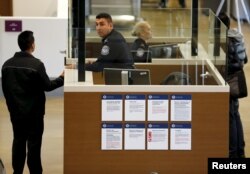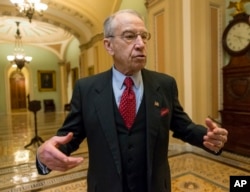Policies supporting the special non-immigrant H-1B visa program in the United States are too restrictive, undercutting free enterprise and ultimately damaging the economy, according to a survey, of U.S. business executives, by a Dartmouth College dean.
The H-1B visas, for which the U.S. began accepting new applications on April 1, are designed to allow U.S. companies to recruit foreign professionals in specialty occupations, those that require at least a bachelor's degree, for a period of up to six years.
Matthew Slaughter, dean of the Tuck School of Business at Dartmouth, said when looking at H-1B contributions to communities in metropolitan areas over the past few decades, the areas with more H-1B immigrants tended to have faster growth in productivity, which economists say would drive increased standards of living and real wages.
“Those communities with more high skilled immigrants [arriving] than native born workers ... had higher wage growth,” he said. “Not just other talented workers, other college graduates, but also less skilled natives.”
Slaughter’s survey of 400 corporate executives, however, shows that companies that desperately need the specialized labor find the H-1B hiring process too expensive.
"Eighty-two percent of respondents in this survey said hiring a foreign worker costs as much as or more than hiring a comparably skilled U.S. worker," said Slaughter, who directed the survey.
Some Americans believe H-1B visa holders are angling to take their jobs, but former U.S. treasurer Rosario Marin, co-chair of American Competitiveness Alliance, said foreign professionals in the high demand high-tech industry are necessary.
"Almost 80 percent [of] full-time graduate students in electrical engineering in the United States are international students,” she said. “In computer science, foreign nationals make up more than 70 percent of graduate students."
Application process
Under current H-1B requirements, foreigners themselves cannot apply, but must wait for prospective employers to file a petition on their behalf.
Some 233,000 applications were filed in the last fiscal year. With an annual quota of 85,000 set by Congress, the visa applications that exceed the quota are allocated via a lottery system.
Applicants who don’t win the lottery are not allowed to work in the United States. Marin said that could benefit economic rivals of the United States.
"Our economic rivals are recruiting them," she said, adding that other countries are approaching the very H-1B visa applicants who are rejected.
Bjorn Billhardt is an entrepreneur who hires H-1B visa holders. He said missing key, talented individuals could potentially kill projects and start-ups that actually represent productivity and creativity.
“In [the] early stage of a company, it’s that critical employee that will make or break the company,” he said.
Slaughter said: "About three quarters of these companies say, 'When we have high skilled positions that go unfilled for longer than about a month, it's a real constraint on the competitiveness and success of their companies.'"
The current H-1B visa program requires the employer to pay the beneficiary a wage that is no less than the wage paid to similarly qualified workers.
Calls for reform
Some people still criticize H-1B visa holders as cheap labor and say the program is being abused, including leading Senators Chuck Grassley and Jeff Sessions. Two Republican presidential candidates also have raised concerns about the H1-B program.
Donald Trump's campaign website says, “Raising the prevailing wage paid to H-1B's will force companies to give these coveted entry-level jobs to the existing domestic pool of unemployed native and immigrant workers in the U.S., instead of flying in cheaper workers from overseas.”
Trump's main challenger Ted Cruz, on his website, calls for a suspension in the "issuance of all H-1B visas for 180 days to complete a comprehensive investigation and audit of pervasive allegations of abuse of the program."
"In recent months," the statement continues, "more and more reports have become public of companies replacing American workers with cheaper foreign workers, contrary to the stated intent of the H-1B visa program."
The U.S. Senate held two hearings in the past year on the impact of the H1-B program on American workers
Slaughter’s survey found that 71 percent of respondents said they would consider moving facilities to other countries if they find it too difficult to hire skilled professionals in the United States.
The New York Times reported last November that top H1-B employers are outsourcing jobs.
Slaughter and Marin are calling on Congress to reform H-1B visa policies to help business development.
This report was produced in collaboration with VOA's Mandarin Service.






